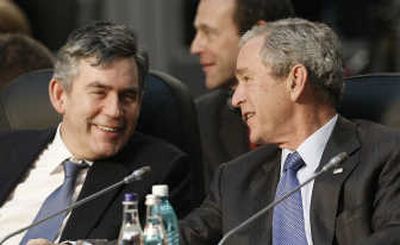Bush garners NATO OK for missile shield

BUCHAREST, Romania – President Bush advanced his plans Thursday to build a controversial missile defense shield in Eastern Europe by winning the unanimous backing of NATO allies and sealing a deal with the Czech Republic to build a radar facility for the system on its soil.
Bush’s success in winning over once-skeptical European governments bolsters his position heading into talks with Russian President Vladimir Putin, who has denounced the shield as the start of a new arms race. The alliance said the system should be expanded, with participation of NATO countries and Russia, to protect all of Europe.
The unified support took some of the sting out of NATO’s rejection of Bush’s other priority here, the offering of road maps to membership for Ukraine and Georgia, two former Soviet republics seeking to escape Moscow’s orbit. Two of Bush’s best new friends in Europe, German Chancellor Angela Merkel and French President Nicolas Sarkozy, led the charge against him on that issue at the NATO summit here, the last of Bush’s presidency.
Yet the deferment of Ukrainian and Georgian applications may help clear the way for a deal on missile defense with Putin, who arrived here Thursday and said through his spokesman that the membership issue was a “red line” for him. Putin joins NATO leaders in a meeting this morning and then will host Bush at his vacation home in the Black Sea resort of Sochi over the weekend.
The United States hopes that moving beyond discord about the two countries’ membership will lead “to an understanding that we will all have an interest in cooperation on missile defense,” Secretary of State Condoleezza Rice told reporters.
The summit was unusually fluid, giving the president mixed results on other fronts as well. He lined up additional NATO troops for Afghanistan, though not as many as officials say are needed. And he presided over the membership invitation to Albania and Croatia, but not a third country he wanted, Macedonia, which was blackballed by Greece in a dispute over its name.
With Bush’s support, NATO leaders agreed to open preliminary discussions about eventual membership with two other former Yugoslav republics, Bosnia and Montenegro, a process called “intensified dialogue” that represents an early stage in the long admission process.